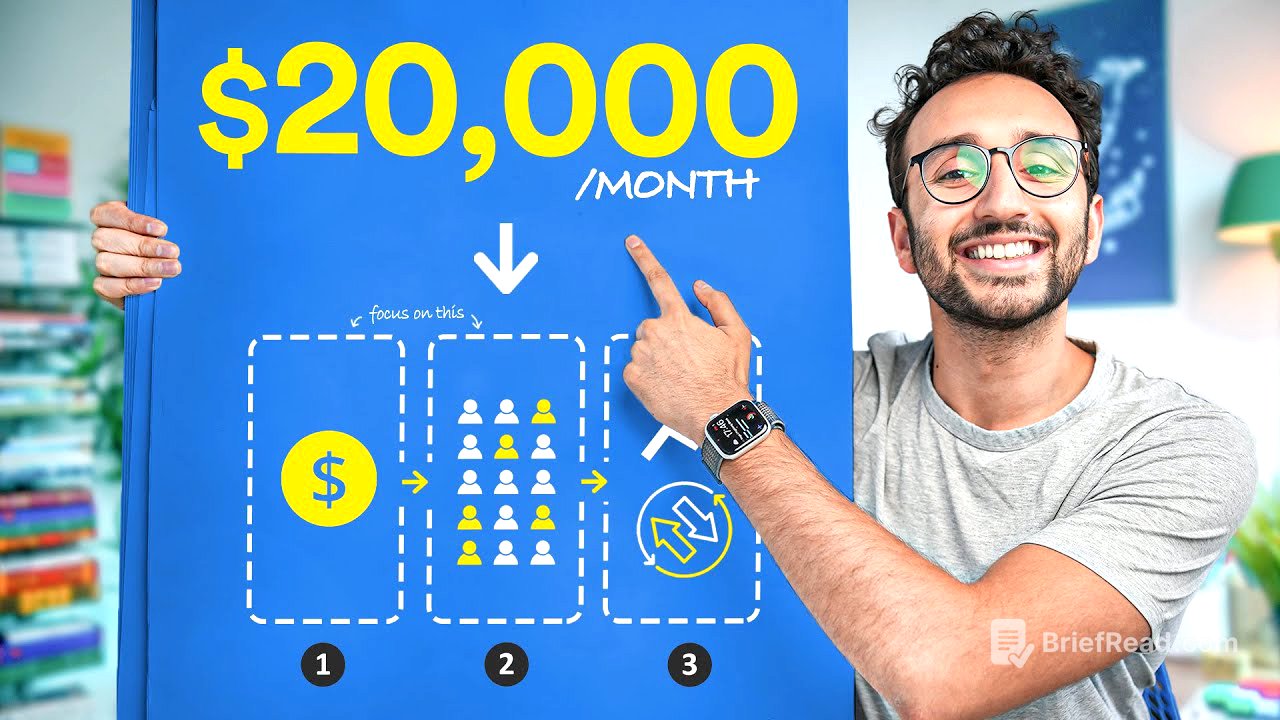TLDR;
This video features Ali Abdaal interviewing Aman, a 23-year-old who successfully transitioned from a software engineer to earning over $20,000 per month from his online business. The discussion covers Aman's journey, the mindsets and strategies he adopted, and practical advice for those looking to make money online and quit their day jobs. Key points include the importance of taking action, embracing failure, continuous learning, and finding enjoyment in the process.
- Taking action and consistency are crucial for success.
- Initial failures are a normal part of the entrepreneurial journey and provide valuable learning experiences.
- Investing in knowledge and skills through books, courses, and coaching can significantly accelerate progress.
- Finding enjoyment in the process is essential for long-term sustainability and motivation.
Introduction [0:00]
Ali Abdaal introduces Aman, a 23-year-old who has achieved financial success through online ventures, earning around $20,000 profit per month, which allowed him to quit his software engineering job. Ali aims to share Aman's story to inspire viewers to take action on their aspirations of making money online. He highlights that many people watch such videos but fail to take the initial steps or remain consistent enough to see results.
Aman's Journey begins [2:03]
Aman recounts how he was inspired by one of Ali's videos four years prior, which demonstrated the possibility of earning passive income through platforms like Skillshare and YouTube. This realization sparked Aman's entrepreneurial journey, leading him to launch his first Skillshare class within a week. Ali reflects on how many viewers consume such content but don't act upon it, questioning what motivated Aman and his brother to take the leap.
Bias to Action [5:05]
Aman attributes his success to a strong bias for action and a high level of self-belief. He believes that with enough time, effort, and work, he can replicate the success of others. Ali connects this to the psychological concept of "locus of control," where Aman demonstrates an internal locus of control, believing his actions directly influence his outcomes. Aman shares an example of quitting his software engineering job within 24 hours of deciding to do so, illustrating his impulsive bias for action.
First Income from Internet [9:24]
Aman and his brother brainstormed ideas for online courses, eventually deciding on a C programming course based on Aman's internship experience. Despite lacking equipment, Aman borrowed a microphone from a friend and quickly created, edited, and launched the course within three days. This course generated $1,500 passively over four years. Ali emphasizes that most people overestimate the success of their first ventures and highlights the importance of taking action over analysis.
Your first 3 businesses will fail [11:43]
Aman emphasizes that the first thing you do doesn't have to be the last thing you do. His initial C programming course on Skillshare, though not a major financial success, served as a crucial first step into the world of entrepreneurship. Ali reinforces this point, suggesting that the first three business attempts are likely to fail, which is a valuable learning experience. He compares it to learning to ride a bike, where falling off is a necessary part of the process.
Concept of Difficulty in Entrepreneurship [14:15]
Ali and Aman discuss the common misconception that entrepreneurship should be easy. Ali shares how even successful YouTubers like Izzy feel discouraged when they encounter difficulties. Aman highlights the importance of pain tolerance and recognizing that the difficulty is what makes success rare and valuable. He believes people often expect things to be incredibly easy and give up at the first roadblock.
Idea of Friction [16:18]
Aman illustrates the concept of friction with an example of trying to find a singing teacher, highlighting the multiple attempts and delays encountered. He emphasizes that achieving anything requires numerous attempts and that friction exists at every step. Ali adds that the ability to follow through and overcome friction is crucial for success, distinguishing the top 1% from those who give up easily.
The timing is never going to be right [18:23]
Ali and Aman discuss the common excuse that "the timing is not right" for pursuing dreams. Ali shares anecdotes from medical school, where doctors with families emphasized that the timing will never feel perfect. Aman agrees, noting that people are adept at convincing themselves not to pursue their dreams. Ali identifies this as procrastination in disguise and encourages acting now, assuming the timing will never be ideal.
The harsh truth about making money online [22:34]
Ali states the harsh truth about making money online: achieving extraordinary outcomes requires more work than most people are willing to do. He emphasizes that everyone who has quit their job to pursue online ventures has had to make sacrifices. Aman shares how he sacrificed watching Netflix and TV to dedicate time to his YouTube channel and business. He also highlights the importance of consuming self-improvement content and implementing productivity hacks.
Your YouTube feed reflects your priorities [26:16]
Aman and Ali discuss how the YouTube algorithm reflects one's priorities based on viewing habits. They suggest that viewers should pay attention to the content they consume and actively seek out content aligned with their goals, such as building a business or making money online. Ali emphasizes that he was intrinsically motivated and passionate about YouTube, which made the hard work feel less like a grind.
Choose hobbies that let you double dip [30:21]
Ali addresses the objection that some people don't have any passions or hobbies beyond passive entertainment. He suggests finding hobbies that "double dip," meaning they are enjoyable and also have the potential to generate income, improve health, or strengthen relationships. He provides examples such as running, playing board games, and participating in hackathons.
You won't know until you try [32:08]
Aman emphasizes that you won't know what you truly enjoy until you try different things. He initially thought he wanted to be a music YouTuber but found that creating educational content was more enjoyable. He encourages viewers not to count themselves out of the business game and to start building things to discover what truly ignites their passion.
The truth about courses [35:35]
Aman shares that a major inflection point in his journey was realizing he could invest in knowledge through business books and coaching programs. He highlights the value of learning from those who have already achieved success. Ali and Aman discuss the common perception that course sellers are scammers and address the issue of loss aversion. Aman emphasizes the importance of overcoming loss aversion, considering the risk reduction through guarantees, and recognizing the value of knowledge.
Aman's Income [38:37]
Aman reveals that after joining a coaching program, his income significantly increased. He went from barely making $5-6K a month to becoming profitable, hitting $30,000 in July, August, and September, $22,000 in October, $55,000 in November, and around $36,000 in December. With expenses around $10,000 a month, he's been making around $20,000 profit per month for the past six months, which is double his previous full-time income.
Final Advice [40:56]
Aman advises viewers to invest in educational resources and their own skills. He emphasizes that it is still possible to create a profitable YouTube channel and make money online, but it requires time, effort, and consistency. He encourages viewers to keep grinding until it works out, highlighting that one can make $10,000 a month online from almost nothing.








![Old Doctors: We MIXED BLACK SEED OIL & HONEY to Treat 19 Problems [After 60]](https://wm-img.halpindev.com/p-briefread_c-10_b-10/urlb/aHR0cDovL2ltZy55b3V0dWJlLmNvbS92aS9KNVVhZDBJeFp3RS9ocWRlZmF1bHQuanBn.jpg)
